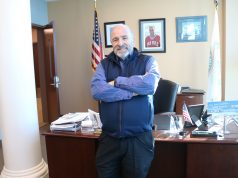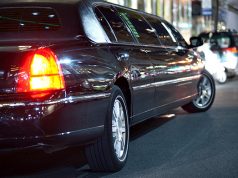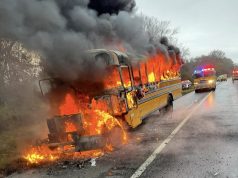
By MADDY VITALE
Eva Feeley, of Sea Isle, is a creative writing coach. She has taught classes at the Ocean City Free Public Library, spoken in schools and enjoys a strong Facebook following for her advice on the written word.
And often she writes about experiences that have inspired her to be a writing coach and speak to younger generations about the craft.
On Wednesday, Feeley, 69, recalled a time back in 1969, Aug. 15-18 on a farm in Bethel, N.Y., where music and memories were made — at Woodstock.
An estimated 500,000 people listened to the likes of Janis Joplin and Jimi Hendrix. Feeley and her late brother, Richard, attended the epic concert together.
Feeley wrote her perspective on the concert in a paper titled: A Golden Memory: 50 Years Ago at Woodstock.
“About two years ago I was invited to the Ocean City library and asked people to come and talk about an amazing thing that happened in their lives,” Feeley explained.
She continued, “I downloaded pictures and gave a presentation about Woodstock. Later that same year, I was asked to speak to English classes about the same thing. There was something really special about Woodstock. And there was so much interest.”

What surprised Feeley, who is married to Sea Isle City Councilman J.B. Feeley, was that even though only a few students heard of the performers at Woodstock, they all seemed to enjoy hearing about her experience.
“People were really interested in hearing about it. It was so well received. Everyone enjoyed hearing about my time,” she said.
Could any musical performance today compare to Woodstock?
“I do think it is a once in history kind of thing,” she noted. “I do want to leave my memories of it to the coming generations.”
Feeley said before she wrote about Woodstock, she never really thought about how significant the event was to her.
“Even when things are really important, when your life changes, you get married and have kids, you suddenly stop thinking about these other major milestones,” she explained.
When a couple of students asked her to do interviews for their school papers, she came up with the paper.
“I came to see over the last several years that suddenly it is an important thing to the younger generation and especially from a personal standpoint,” Feeley said.
Above all, Feeley said she detailed how getting to Woodstock took effort.
“One of my Facebook friends read my post and said they had never heard the side of Woodstock that it was a difficult process to get there and stay there,” Feeley explained. “You really had to be into the music to stay there. I’m happy I did and I hope in writing about it I covered the things people would find interesting.”

Eva Feeley’s A Golden Memory: 50 Years Ago at Woodstock
As a young person, I was a music freak. I still am, I just enjoy a different kind of music now. So, you can imagine my excitement when in 1969 at 19 years old I heard about the Woodstock Festival.
I mean, Joan Baez, Santana, the Grateful Dead, Janis Joplin, the Who, Jefferson Airplane, Blood, Sweat and Tears, Crosby, Stills, Nash and Young, Jimi Hendrix. The lineup was a Who’s Who of the music of the 60s.
But even before Woodstock the spring and summer of 1969 were incredible. In the spring the US stepped up its bombing of North Vietnamese positions in Cambodia, in July Neil Armstrong and Buzz Aldrin landed on the moon, and just weeks before Woodstock the (grisly) Manson family murders shocked the nation.
It was in this social and political climate that my brother and I first heard about the Woodstock festival from New York City friends who were vacationing in Wildwood. My brother Richard was 18 at the time and a talented musician.
Like me, his life was music (his life would tragically be a short one; he died at age 45). We both agreed that though the trip would be a long one, we were not going to miss this once-in-a-lifetime festival.
The plan was Richard and I would take a bus to meet our new friends in New York City, buy our tickets at a record shop in their neighborhood and then they would drive us the rest of the way to Woodstock.
The almost unbelievable cost of the tickets was $6 a day, $18 for the entire weekend to see almost all of the most popular musicians of the time.
Well, that part of the plan worked. On the drive up we envisioned a large crowd of maybe 50,000 people, sitting on lush grass, plenty of food and drinks being sold at concession stands, and a nice quiet area to pitch our tent each night.
Being young, we were stupid and being city kids, we were unprepared for sleeping outdoors for three days. All Richard and I had in our backpacks were a change of clothing and a towel.
I can’t imagine where we thought we were going to shower! Fortunately, our NYC friends had more foresight and brought along a tent and some blankets.

Miles before the concert site, we ran into the most astonishing traffic jam we’d ever witnessed. Cars were blocking the entire road in all directions. We heard that by the end of the festival the roads were closed up to 20 miles away. There was nothing for us to do but park the car on the shoulder of a very narrow country road and start walking.
When we very wearily arrived at the gate, we saw that it had been knocked down, and there was a sign up that read “no tickets necessary, just come in”. My brother and I were furious that we had each spent the small fortune of $18 unnecessarily.
However, in the darkness we could hear the sweet voice of Joan Baez in the distance and our excitement once again grew.
We were dumbstruck when we saw the number of people sitting and dancing in the field in front of the stage. There wasn’t a single person there who had anticipated anything like it. It turns out that Baez was the last performer that night. It was about 1 a.m. and the rain that had started earlier continued.
Our vision of a private and lush campsite was in reality pitching our tent in a crowded, muddy field that resembled a refugee camp. We soon learned that we were not only ill-prepared in the shelter and clothing department but in the food department as well. Aside from some fruit, peanut butter crackers, and juice that we had brought along, we could look forward to very little else.
We each had a small sum of cash and we counted on buying food and drinks at concession stands. By the time we had gotten there on day one there were already food and water shortages.
We were grateful to share our friends’ tent that rainy night. Before we set up camp, I searched for a restroom. I saw a line of porta-pots in the distance and began walking toward them. As I got closer, I could feel my feet sinking into the mud.
That was my last attempt to reach a toilet. For the remainder of our stay, we’d pick our way through the crowds to the shelter of trees which was a less disgusting option, believe me.

The next morning, we walked to the concert area and immediately became separated from our friends. We never saw them again – and I mean never. Sadly, I don’t even remember their names.
Once we found a foot or two of space to wedge ourselves into on a surface that was pretty much wet cow poop, we were essentially trapped there until we left. We considered ourselves very fortunate because we had a great view of the stage. We would take turns jealously guarding our spot when the other had to answer nature’s call.
Throughout the day, helicopters dropped bags of oranges and thousands of sandwiches that volunteers in surrounding towns had kindly made along the edges of the crowd and everyone took just one and passed the rest along.
I was so hungry at that point, an orange never tasted so good. Giant water tanks were replenished by the local fire department, but it was almost impossible to get to where they were located. Thirsty as I was, I passed on the beverages that were being handed to me. I suspected that they were laced with LSD and I couldn’t possibly have felt any higher than the music and comradery were making me.
Saturday was the only day that it didn’t rain and what a day it was. The music started around noon and didn’t end until Sunday morning. Richard and I thrilled to Santana, Creedence Clearwater Revival, the Grateful Dead, Janis Joplin, Sly and the Family Stone, the Who, and Jefferson Airplane.
We dozed intermittently on each other’s shoulders or on the shoulders of strangers. There just wasn’t enough room to lie down. On Sunday afternoon, the music resumed. I remember Ten Years After, The Band, Johnny Winter, Blood Sweat and Tears, Crosby Stills Nash & Young and Butterfield Blues Band.
We woke up on Monday morning to Sha Na Na performing through a misty rain.

At about 8:30 am, Jimi Hendrix came on the stage to perform. He played for a long time including his famous guitar version of the Star-Spangled Banner. He was the last act we saw.
We gave in to a combination of exhaustion and hunger. We went down to the lake, washed as much mud off of ourselves as we could, pulled on the clean tee shirts and jeans we had each brought with us in our backpacks, and walked to town to get a bus back to New York City, on to Atlantic City, and finally to Sea Isle City. We were embarrassed because we knew we were treating all the non-festival passengers to the “farm smells” we’d been sitting in for three days.
When we returned home to Sea Isle City where our family had a summer home, our parents and younger siblings were frantic. They knew so much more than we did about what Woodstock had become by listening to the news. We thoroughly enjoyed our showers, clean clothing, and mom’s delicious food.
It wasn’t until the days after we returned home that we began hearing on the radio just how many people had turned out. The commonly accepted number is a half million, although a Woodstock historian claims that it was more like 700,000. Some people who had attended the festival stayed on and were paid to clean up the god-awful mess that was left behind.
Although there was no violence during the entire event, there was some tragedy. During the cleaning up process, a young man was run over while he slept in his sleeping bag by a tractor. The driver just assumed the sleeping bag was empty like thousands of others that had been left on Max Yasgur’s dairy farm. Two people died of drug overdoses.
Tragic, of course, but my brother and I understood that we had unwittingly participated in history. Half a million young people gathered in a field in the rain with little food and sleeping in foul-smelling mud and yet there was no violence, only love for the music and for each other. The event was a model for the way the world could be if we chose to live in peace.
I have thousands of snapshots, but they are all mental ones. We didn’t take a single photo. We wanted to travel light and the last thing we thought about was bringing a camera. I regret that now and have to laugh at how I would have packed if I went to see dozens of my idols perform today. My iPhone would have been filled to capacity with photos and videos!
It took me several days to feel like I belonged in my home after the festival. All of the people we spoke to at the concert agreed that we were part of a nation at Woodstock. We vowed to ourselves and each other that we would not allow this community of love to end when we left that farm. But it did end, and quicker than I ever expected.
A week after we returned home, I received a phone call from the principal of Saint Theresa School in South Philadelphia. Sister told me that I had been hired to teach fourth grade there and that I needed to get right up to Philly to prepare my classroom.
I won’t say that my carefree youth ended that summer. Two summers later I hitchhiked through Europe with two of my friends and that was a memorable and carefree experience.
A year later, I married and that was the beginning of my actual adult life. But an event like Woodstock can only ever happen once. I think of it often. I’m glad that it happened when I was young because young people have a way of coping with discomfort and plans going awry.
I’m sure it’s not something I could do now. I tell my 18-year-old grandson about it and although he thinks of me as just another old lady, he has to admit this is one cool thing that Grandmom did.
I also wonder how I would feel about him going to an event like Woodstock 50 years later, in August 2019. Would I feel confident that it would play out as three days of peace, love and rock ‘n roll?
For more information about Eva Feeley’s works visit her on Facebook.








